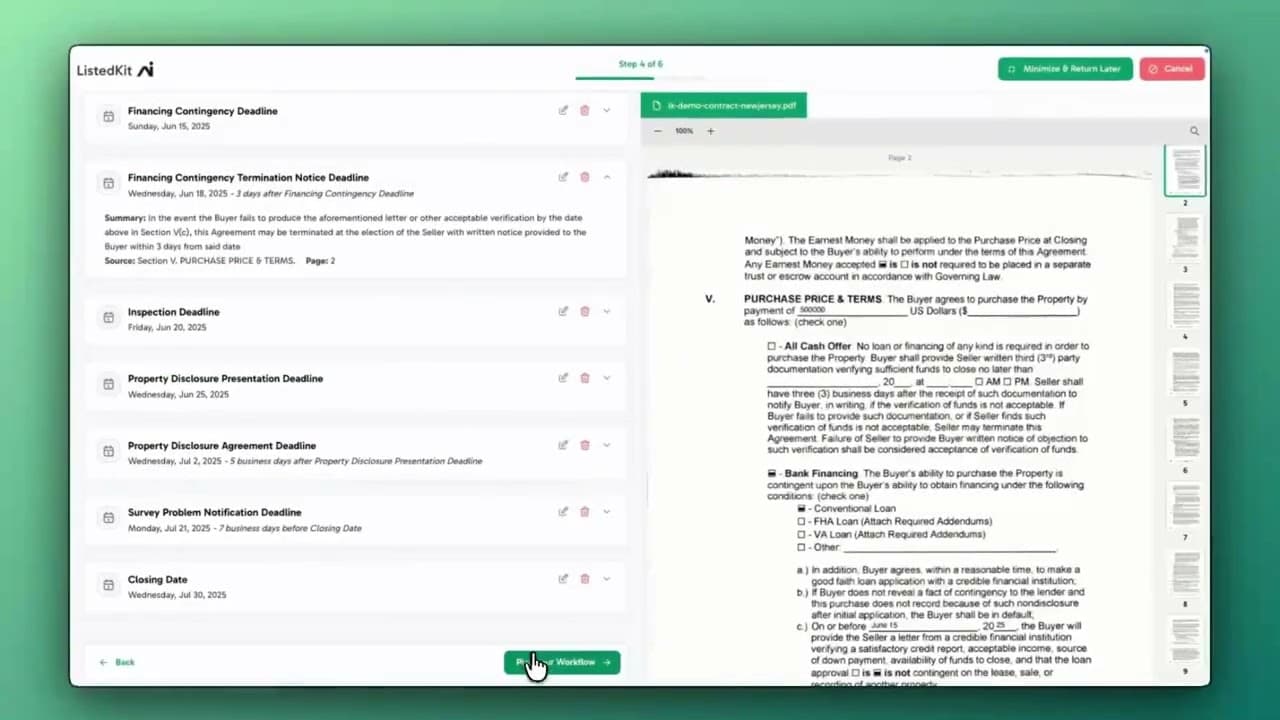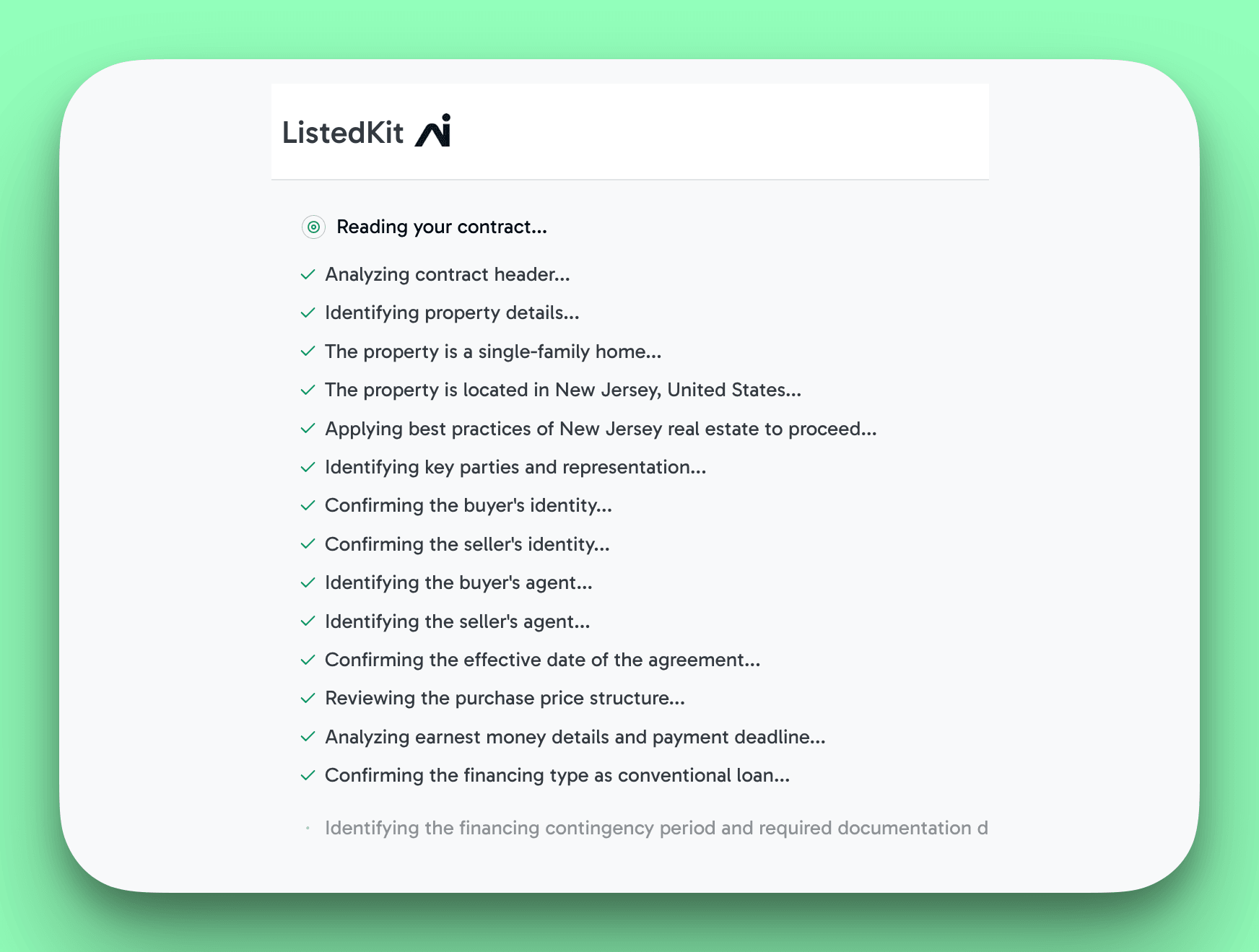
Stop Babysitting Your Deals.
Ava tracks every contract detail and deadline so you can stop worrying and start closing.
First intake free. $9.99/intake after that. No subscription, no commitment.
Trusted by leading real estate professionals







Watch Ava read a contract in 60 seconds
See how Ava extracts dates, parties, and terms from any purchase agreement.

TCs spend hours on tasks that should take minutes
Manually entering contract data. Calculating "7 business days before closing." Writing the same emails over and over. Updating every task by hand when a closing date moves.
Your team's job isn't to spend hours on data entry keeping systems up to date—it's to close deals.
Meet Ava: Your AI Transactions Assistant
Ava is the second set of eyes you've always wanted. Built specifically for real estate professionals, Ava understands the nuance of real estate agreements as well as you do.

Three steps to your most organized closing yet
No complex AI setup. No learning curve. Just upload and go.
Upload Your Contract
Drag and drop any purchase agreement. Ava reads it in under 60 seconds.
Verify the Timeline
Review the auto-generated deadlines, contingencies, and task lists.
Close with Confidence
Ava syncs to your calendar and drafts your communications. You just hit "send."

What You Can Do With Ava
From intelligent contract analysis to team collaboration - see how Ava transforms your entire transaction workflow
Contract Analysis
Ava, can you analyze this purchase agreement and extract all the key dates and milestones?
Can you process this addendum and update the existing timeline automatically?
Ava, I just got a new listing agreement signed. Can you extract the key details and set up the listing management workflow?
Task Management
I just finished the appraisal scheduling and got the inspection report uploaded. Can you check these off my task list?
The Johnson buyers just asked for a second walkthrough before closing. Can you add that to my task list with a deadline of Thursday?
Communication Hub
Draft an email to the lender requesting a status update on the loan application.
Send a transaction summary to all parties with the current status and next steps.
Draft a closing reminder email for next Friday's closing and schedule it to send Thursday morning at 9am.
Team Collaboration
Sarah is out sick today and the Miller closing is Friday. I need to reassign all her tasks to myself so I can handle everything directly. Can you move them all over to me?
Document Intelligence
What are the major issues in this inspection report?
Summarize this loan application and add the requirements as tasks.
Include the key points from this warranty deed in an email to the attorney.
Timeline & Calendar
The Peterson contract just got amended - closing moved from March 15th to March 22nd. I need to update the timeline and sync all the new deadlines to my calendar. Can you handle this and make sure everyone gets the updated schedule?
CRM Integration
I'm starting a new transaction for Sarah Johnson. Can you pull her contact info from Follow Up Boss so I don't have to type everything manually?
Who Uses Ava?
Real estate professionals across the industry trust ListedKit AI to manage their transactions
What Our Users Say
Real feedback from real estate professionals
"This has transformed the way coordinators work. The intuitive features and smart automation save me valuable time. I'm excited to see how this will continue to transform my workflow"
"With the advent of AI, I've been searching for an affordable and comprehensive program to ease the load that we're under. I've found this with ListedKit AI. Very easy to use and rings all the bells and whistles we need!"
"ListedKit is the most in tune real estate transaction coordination system I've ever seen."
"ListedKit's AI intake pulled my Hawaii contracts and built accurate timelines in minutes. The PDF timeline summaries, Google Calendar sharing, and smart email templates cut my weekly update work dramatically—exactly what I need to manage 60+ escrows."
"ListedKit AI is a game changer for real estate transactions. It simplifies transaction management, keeps everyone in the loop, and saves us a ton of time. Highly recommend for any real estate team or solo agent looking to streamline their workflow - this tool makes a big difference."
"Setup was minimal. Ava learns my task lists and keeps everything moving. I'm in Michigan and even with our forms, it handled the details well. This is exactly the kind of automation that saves hours and lets me focus on clients."
"ListedKit AI has been a game changer for my business. It's like having a super fast second set of eyes on my documents. And even the humans are awesome! Karan gives Ava a run for its money!! Thanks for always being there!"
"This has transformed the way coordinators work. The intuitive features and smart automation save me valuable time. I'm excited to see how this will continue to transform my workflow"
"With the advent of AI, I've been searching for an affordable and comprehensive program to ease the load that we're under. I've found this with ListedKit AI. Very easy to use and rings all the bells and whistles we need!"
"ListedKit is the most in tune real estate transaction coordination system I've ever seen."
"ListedKit's AI intake pulled my Hawaii contracts and built accurate timelines in minutes. The PDF timeline summaries, Google Calendar sharing, and smart email templates cut my weekly update work dramatically—exactly what I need to manage 60+ escrows."
"ListedKit AI is a game changer for real estate transactions. It simplifies transaction management, keeps everyone in the loop, and saves us a ton of time. Highly recommend for any real estate team or solo agent looking to streamline their workflow - this tool makes a big difference."
"Setup was minimal. Ava learns my task lists and keeps everything moving. I'm in Michigan and even with our forms, it handled the details well. This is exactly the kind of automation that saves hours and lets me focus on clients."
"ListedKit AI has been a game changer for my business. It's like having a super fast second set of eyes on my documents. And even the humans are awesome! Karan gives Ava a run for its money!! Thanks for always being there!"
Join hundreds of teams who save hours every week
Only pay for what you use.
Stop paying for software during your slow months. We believe in transparent, usage-based pricing that scales with your volume.
How many credits do you need?
💡 Each credit covers one transaction stage: one for creating a listing and one for creating a sale once it goes under contract.
Credits never expire. Buy in bulk and save up to 60%.
Frequently Asked Questions
Everything you need to know about getting started with ListedKit AI
Ready to take your Saturdays back?
Join the hundreds of real estate teams who are using AI to reclaim their time and scale their business.
Your first deal is on us. See the magic of AI contract intelligence in 60 seconds.